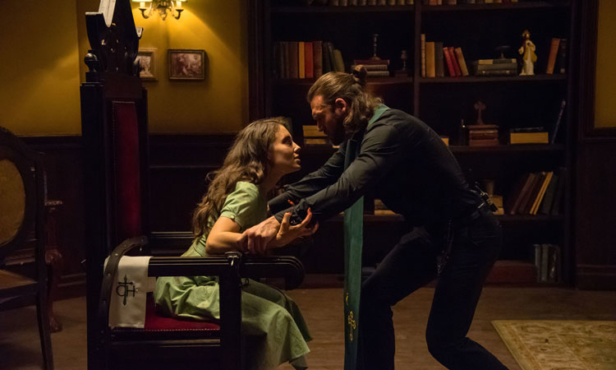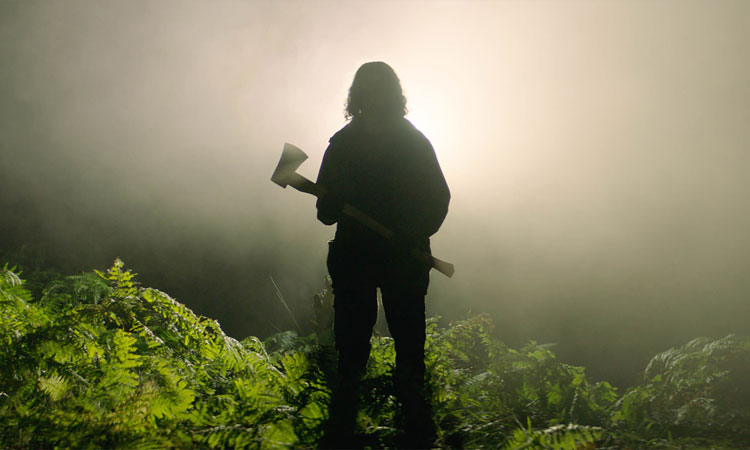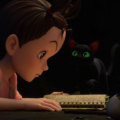Cleansing Hour is a live-streaming webcast in which exorcisms are performed on frothing, bleeding clients by ‘hot priest’ Father Max (Ryan Guzman), who uses the show to spread his own fame and flog kitsch merchandise. Though certainly Catholic, the self-loving, womanising Max is no real priest, and the show’s demonic possessions are all fake, staged by paid actors with smoke and mirrors. The producer Drew (Kyle Gallner), who is also Max’s best friend since childhood, worries that the programme’s viewing figures have recently plateaued and its days of profitability are numbered, while Max, hungry for personal fame, ignores all the signs of stasis. Yet someone has noticed the show and its potential reach, and tonight, as Drew’s girlfriend Lane (Alix Angelis) steps in at the last minute to play possessed, she will find herself hosting an unwelcome guest in the form of a very real devil with designs on cleaning house, gaining an audience and making Max and Drew’s show a living hell – or at least a purgatory.
Expanded from his 2016 short film of the same name, Damien LeVeck’s The Cleansing Hour slips into that recent tradition of films – including the Vicious Brothers’ Grave Encounters (2011), Tony West’s Deadtectives (2018), Jesse Thomas Cook and Matt Wiele’s The Hoard (2018) and Fabricio Bittar’s Ghost Killers vs. Bloody Mary (2018) – where charlatan webcasters exploiting people’s belief in the paranormal are suddenly confronted with the genuine article and left fighting for their lives. It also has at its centre a helpless, bound woman – that staple of horror – who simultaneously is there to be saved by male characters, and holds all the power. It is a sophisticated narrative, playing on its own internal contradictions, and repeatedly challenging our own motivations and morality as viewers.
The Cleansing Hour begins with an episode of the webcast being filmed, and shows us how all the effects are put together to make an exorcism look both cinematic and credible – and it is only after this that it presents us with a ‘true’ possession, ‘live’ on air and realised through better SFX, and captures the panic of a fraudulent exorcist and his crew not knowing what to do, as they discover that they are being played by an entity far better at confidence tricks media manipulation than they are. In other words, like Daniel Stamm’s The Last Exorcism (2010) and Stephen Cognetti’s Hell House LLC (2015), it first exposes the strings of its own artifice before having to pull them all over again, more convincingly.
This careful layering of realities also messes with the viewer, confounding our sense of suspended disbelief, perhaps even of faith – while the constant stream of viewer comments made visible live on screen, and the regular cutaways to different people around the world riveted to their devices as they watch the unfolding pandemonium, modulate our own responses to the film while ultimately confronting us with the bestialising, zombifying impact of such entertainments.
While The Cleansing Hour at first struggles to distinguish itself from the many mediocre possession horror rivals whose language it necessarily apes and adapts, and is never a match for the subgenre’s best (less subtle than The Exorcist, less restrained than Luz, etc), where LeVeck’s film really does come into its own and (eventually) hits hard is as a metacinematic satire of ‘confessional’ programming, online sensationalism and the alienating effect of an internet which can so easily render us all less than human. For the film unflinchingly reflects, via genre, upon the narcissism, hypocrisy and prurience that characterise our new wired world, and reveals just how ready we are to be transformed into demonic servants through our insatiable hunger for excess. Here modern technology, far from being a digital defence against the devil, is just another medium through which the Beast can enter our headspace and become legion. The film’s earlier scenes are shrill and not a little derivative, but by the end all this resolves into something horrifyingly cynical about human nature and modern, secular, plugged-in society’s willingness to sell its soul – on any platform.
The Cleansing Hour was seen and reviewed at Glasgow FrightFest 2020.



